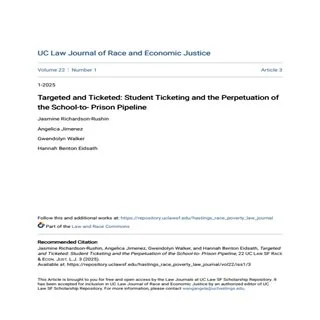By Jasmine Richardson-Rushin, Angelica Jimenez, Gwendolyn Walker and Hannah Benton Eidsath
As a term, the “school-to-prison pipeline” gained widespread use in the early 21st century as a shorthand for policies and practices that push students out of school and towards incarceration. It is a disturbing national trend wherein students (many of whom are Black or Brown, or have disabilities, or histories of poverty, abuse, or neglect) are siphoned out of schools and into the juvenile, municipal and criminal legal systems. Though the term itself would seem to be a part of the modern zeitgeist, the phenomenon's origins can be traced back to the creation of the society in which it is perpetuated. Education, both in its access and ideals, has often reflected the ideals and access of the society in which it exists. If the fabric of society is woven with a devotion to capitalism and staunch adherence to caste systems, the educational institutions within that society often reproduce and replicate those paradigms. Thus, to discuss schooldiscipline, one must do so within the context of society's driving factors.
Schooldiscipline, both in its language and application, perpetuates the idea that children from historically marginalized communities are the lowest rung of society. Be it ethnic, racial, ability, or class differences, it is all too common that schools approach discipline in palpably different ways based on a student's identity. This is especially true when there is already inequity in educational processes in areas as diverse as tracking, representation in curriculum, quality of instruction, physical resources, and school funding. As research surrounding the school-to-prison-pipeline expands, evidence supports two general concepts regarding student discipline: one, that the presence of Student Resource Officers (SROs) increases the school's likelihood that school-based behaviors will be reported to law enforcement agencies; and, two, that reporting schooldiscipline to law enforcement agencies disproportionately affects Black, Brown, and Indigenous students, and students with disabilities.
Though policing in schools dates back to as early as 1939, increased police presence in schools garnered federal support through President Lyndon B. Johnson's establishment of the Commission on Law Enforcement and Administration of Justice. The Commission released a racially-charged report in 1967 claiming that Black youth “account for a disproportionate number of arrests” and asserting that youth were the largest threat to public safety. This report allowed for considerable attention to be placed on Black youth and ““continual youth warfare,” and set the context for local law enforcement agencies to apply for federal funding to increase policing in schools and increase targeting of Black, Brown, and Indigenous students.Over time, in areas in which Black, Brown, Indigenous and poor students made up much of the population, there became an increasing number of SROs in those school districts, not because there existed a need for more safety in these areas. With an increased presence of SROs, educators and administration are now more likely to involve law enforcement intervention for discipline issues that were previously handled by the school. According to the U.S. Department of Education Office for Civil Rights, during the 2020-2021 school year, Black students represented 15% of total K-12 student enrollment, but 18% of students who were referred to law enforcement, and 22% of students subjected to school-related arrests. Students with disabilities served under the Individuals with Disabilities Education Act (IDEA) represented 14% of total K-12 student enrollment, but 22% of students referred to law enforcement, and 22% of students who were subjected to school-related arrests. These early contacts with law enforcement are particularly harmful to Black students for whom police contact leads to an increased likelihood of arrest as young adults.
The U.S. Department of Education Office for Civil Rights found similar disparities in exclusionary school discipline: Black boys represented 8% of total K-12 student enrollment, but 15% of students who received one or more in-school suspensions, 18% of those who received one or more out-of-school suspensions, and 18% of those who were expelled. Black girls represented 7% of total K-12 student enrollment, but 8% of students who received one or more in-school suspensions, 9% of students who received one or more out-of-school suspensions, and 8% of students who were expelled. Students with disabilities served under IDEA represented 14% of total K-12 student enrollment, but accounted for 18% of students who received one or more in-school suspensions, 24% of students who received one or more out-of-school suspensions, and 17% of students who received expulsions. Students with disabilities served only under Section 504 represented 3% of total K-12 student enrollment but represented 6% of students who received one or more in-school suspensions, 5% of students who received one or more out-of-school suspensions, and 4% of students who received expulsions.
22 UC Law Journal of Race and Economic Justice 3 (January, 2025)



